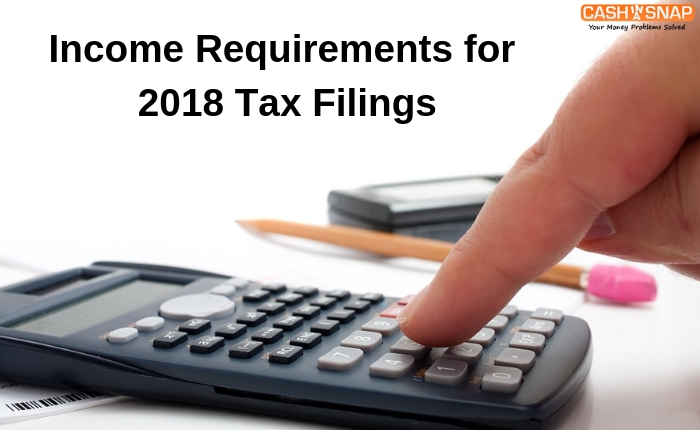It is not necessary for everyone to file a federal income tax return. Only those whose income exceeds a certain threshold must file. However, there are some good reasons why you might want to consider filing even if you don't have to (see below).

What was your gross income for the year 2018? The IRS has defined gross income as "the income you get in the form of money, property, goods, and services not exempted from tax."
Filing Requirements by Income
If your income equals or exceeds the amounts shown in the chart below, you should file a tax return. The gross income column refers to the income you earned in 2018, which you must report when you file your tax return for the year. If you have any questions, be sure to consult your tax preparer or CPA.
|
2018 Filing Requirements for Most Taxpayers |
||
|
Your Filing Status |
at the end of 2018 you were... |
You must file a return if your gross income was at least... |
|
Single |
Under 65 |
$12,000 |
|
65 or older |
$13,600 |
|
|
Married filing jointly |
Under 65 (both spouses) |
$24,000 |
|
65 or older (one spouse) |
$25,300 |
|
|
65 or older (both spouses) |
$26,600 |
|
|
Married filing separately |
Any age |
$5 |
|
Head of household |
Under 65 |
$18,000 |
|
65 or older |
$19,600 |
|
|
Qualifying widow(er) with dependent child |
Under 65 |
$24,000 |
|
65 or older |
$25,300 |
|
How does the IRS calculate the numbers?
Filing requirements have historically been a taxpayer's standard deduction and personal exemption amounts combined. However, the tax cuts which went into effect in January 2018, eliminated personal exemptions from the tax code through at least the end of 2025. Thus, your filing requirement is equal to the standard deduction for your filing status.
For a single taxpayer, the standard deduction in 2018 was $12,000, so you would have to file a tax return if your gross income was $12,001. You would subtract the $12,000 standard deduction from that number, and you would have to report and potentially pay tax on that balance of a $1. Your tax liability, what you're required to pay the IRS in federal tax, is based on your taxable income, which is your gross income minus any deductions you may have.
The standard deduction varies based on a taxpayer's filing status, and people who are 65 or older and blind persons get an additional standard deduction on top of their regular standard deduction. Their filing requirements differ due to these additional amounts.
Why would it be a good idea to file even if you aren’t required to?
You may want to file a return even if you're not required to do so. If there were any taxes that were withheld from your income, such as withholding on wages or retirement plan distributions, you overpaid your taxes if your income falls below the above thresholds. You don't have any tax liability, so you're entitled to a refund of the money that was withheld. The IRS will keep this refund with it unless you file a tax return.
To begin an audit, the IRS has three years from the date a tax return is filed. This time limit never begins running if a return hasn’t been filed. By not filing, you could potentially be exposed to audit or collection actions. Filing a return starts the clock ticking on these time limitations.
You should file a return even if you don't have to if you have been—or might be—a victim of identity theft. Filing a tax return notifies the IRS about your true income for the year, and it also prevents the identity thief from filing a fake income tax return by using your name and Social Security number.
As always, consult a professional tax preparer, accountant, or CPA for advice and to help with filing your return, if needed.
In need of quick cash to help pay a small tax bill? If you tried other resources and have no options, try a quick cash tax loan with CashinaSnap.
Also Read: Important 2019 Income Tax Deadlines You Should Not Miss
Also Read: When Should You Expect Your Tax Refund in 2019?
Also Read: Tax Deductions: How They Help in Retirement Planning


